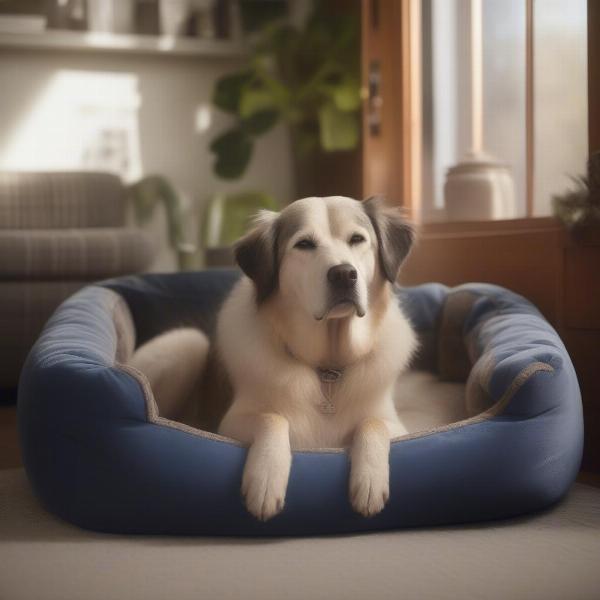Excessive panting in a senior dog can be concerning for any owner. While some panting is normal, especially after exercise or in hot weather, frequent or heavy panting in older dogs can signal an underlying health issue. This article will delve into the common causes of excessive panting in senior dogs, offering practical advice on when to seek veterinary care and how to manage the situation at home.
Several factors contribute to increased panting in older dogs. As dogs age, their bodies become less efficient at regulating temperature, making them more susceptible to heat stress. Pain, especially from conditions like arthritis, is another frequent culprit. Senior dogs may also experience increased anxiety, which can manifest as excessive panting. Heart and lung issues also become more prevalent with age and can lead to labored breathing and panting.
Identifying the Cause of Excessive Panting
Pinpointing the exact reason for your senior dog’s panting requires careful observation and, often, a veterinary examination. Is the panting constant, or does it occur only after certain activities? Does your dog seem distressed or uncomfortable? Is there any accompanying coughing, wheezing, or changes in appetite or behavior? These details can help your veterinarian reach a diagnosis.
Is It Just Old Age?
While aging itself isn’t a direct cause of panting, it often comes with health conditions that can trigger increased respiration. For example, dog panting while resting might indicate pain or discomfort, which is more common in senior dogs. Therefore, it’s crucial to differentiate between normal age-related changes and signs of an underlying health problem. A change in panting patterns warrants a vet visit.
Common Medical Reasons for Panting in Older Dogs
- Pain: Arthritis, cancer, and other age-related conditions can cause chronic pain, leading to increased panting.
- Respiratory Problems: Conditions like pneumonia, bronchitis, and even allergies can make breathing difficult, causing your dog to pant more.
- Heart Disease: As the heart weakens, it struggles to pump blood efficiently, resulting in panting and other symptoms like fatigue and coughing.
- Cushing’s Disease: This hormonal disorder can cause increased thirst and urination, along with excessive panting.
- Cognitive Dysfunction Syndrome (CDS): Similar to dementia in humans, CDS can cause anxiety and confusion, leading to increased panting.
“Addressing the root cause is essential,” says Dr. Emily Carter, DVM. “A thorough examination and appropriate diagnostic tests are crucial to rule out serious medical conditions and ensure the best possible outcome for your senior dog.”
Managing Panting at Home
While veterinary care is essential for diagnosing and treating underlying medical conditions, you can take steps at home to help manage your senior dog’s panting:
- Maintain a Comfortable Temperature: Ensure your dog has access to a cool, shaded area, especially during hot weather.
- Provide Fresh Water: Dehydration can exacerbate panting, so always keep a bowl of fresh water available.
- Reduce Stress and Anxiety: Create a calm and predictable environment for your dog, minimizing exposure to loud noises and stressful situations. Consider using calming aids like pheromone diffusers or anxiety vests. pajama pants with dogs can also provide comfort.
- Weight Management: Obesity can worsen panting and other health issues. Maintaining a healthy weight through a balanced diet and regular exercise is crucial.
- Pain Management: If your dog is experiencing pain, consult your veterinarian about pain relief medications.
 Senior Dog Resting Comfortably
Senior Dog Resting Comfortably
Conclusion
Excessive panting in senior dogs can be a sign of a serious health problem. By understanding the potential causes and taking appropriate action, you can help your furry friend enjoy their golden years in comfort and good health. If your senior dog is panting excessively, don’t hesitate to consult your veterinarian. Early diagnosis and treatment are key to managing underlying conditions and improving your dog’s quality of life.
FAQ
- Q: Is panting always a sign of a problem in senior dogs?
A: No, some panting is normal. However, excessive or sudden changes in panting patterns should be investigated by a vet. - Q: What are the first steps I should take if my senior dog is panting a lot?
A: Ensure they are cool and hydrated, and then contact your veterinarian for advice. - Q: Can pain medication help with panting?
A: If the panting is due to pain, pain medication can help alleviate the symptom. Consult your veterinarian for appropriate pain management options. - Q: How can I make my senior dog more comfortable?
A: Provide a comfortable resting area, ensure access to fresh water, and minimize stress. - Q: Is it normal for senior dogs to pant more in their sleep?
A: While some panting can occur during sleep, excessive panting while resting should be addressed by a vet. dog guard for car is important for safe travels. - Q: Can anxiety cause panting in older dogs?
A: Yes, anxiety and stress can lead to increased panting. dog in trousers may be a sign of anxiety or just a fashionable pup! - Q: What tests might my vet run to diagnose the cause of panting?
A: Blood tests, X-rays, and other diagnostic tests may be needed to determine the underlying cause. leprechaun dog costume is fun, but excessive panting is not.
ILM Dog is your trusted global resource for all things dog-related. We are committed to providing expert, practical advice on dog breeds, health, training, nutrition, grooming, and much more. Whether you’re a seasoned dog owner or just starting out, ILM Dog offers valuable insights to help you provide the best possible care for your canine companion. Contact us for expert advice at [email protected] or +44 20-3965-8624. Visit us online at ILM Dog for more helpful information and resources.